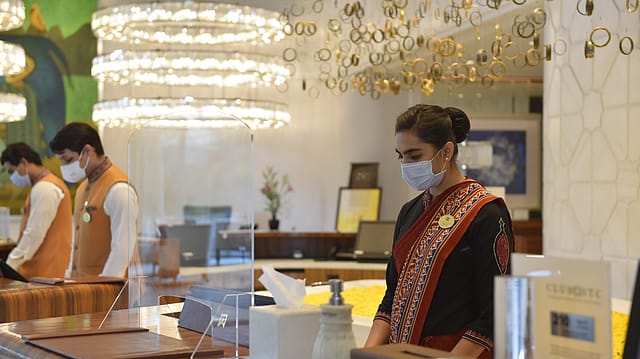Hotel industry revenues, margins to reclaim pre-Covid levels in FY23: ICRA
ADVERTISEMENT

The hotel industry's revenues and margins are expected to return to pre-Covid-19 levels in the financial year 2022-23, according to ratings agency ICRA.
The demand is expected to stem largely from domestic leisure and transient travel, although there will be gradual recovery in business travel and foreign tourist arrivals (FTAs), ICRA says in a report.
Notwithstanding the potential impact on demand with further Covid-19 waves, ICRA expects pan-India premium hotel occupancy to be at 68-70% for FY2023, while the average room rate (ARR) is expected to hover around ₹5,600-5,800.
The improved operating leverage along with sustenance of cost-optimisation measures will support margins and accruals for hotels, ICRA says.
"The industry witnessed a healthy start to FY2023, with 56-58% occupancy in premium hotels in Q1 FY2023. It was up from around 40-42% in FY2022 and closer to pre-Covid occupancy of 60-62% in Q1 FY2020," says Vinutaa S, vice-president and sector head, ICRA.
Pan-India ARR stood at around ₹4,600-4,800 in Q1 FY23, as against ₹4,200-4,400 in FY22, the report says. "It still remains at a 16-18% discount to pre-Covid levels on an average, although a few high-end hotels and leisure destinations witnessed ARRs spike to higher than pre-Covid levels in the last few months."
The demand recovery was aided by leisure, transient passengers, MICE (meetings, incentives, conferences, and exhibition), weddings, and gradual pickup in business travel and foreign tourist arrivals (FTAs).
Some cities also witnessed traffic from specific events. While leisure destinations and gateway cities witnessed healthy occupancy, cities largely dependent on business travellers, like Bengaluru and Pune will take a few more months to recover.
Although Q1 FY2023 was among the best quarters since the onset of Covid-19 pandemic, the revenue per available room (RevPAR) remains 20-22% lower than pre-Covid levels and at about 45-50% discount to the FY2009 peak. For midscale hotels, the recovery has been slower, due to the dependence on business travel. Further, cost inflation can also have a bearing on mid-scale hotel demand.
ICRA expects debt metrics to go back to pre-Covid levels in FY23 supported by better accruals. "While some companies have already raised funds predominantly by way of equity, more announcements on fund raising can also be expected for deleveraging," the report says, adding that return on capital employed (RoCE) is expected to remain a sub-cost of capital at least for the next four years.
"Construction activity has restarted in majority of the deferred projects. However, the per room cost has increased by 10-15% because of cost inflation. Also, acquisitions or consolidation of smaller hotels have been significantly lower than expectations due to the demand revival and improvement in liquidity," the report says.